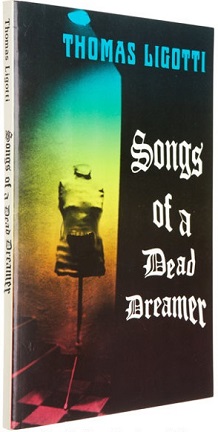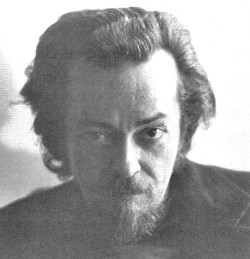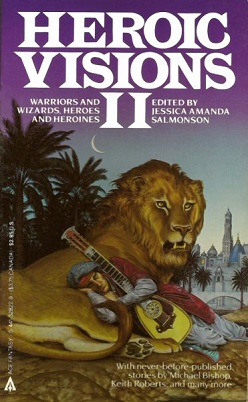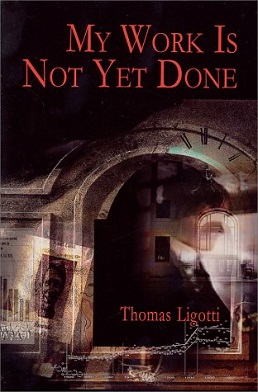
Fritz Reuter Leiber Jr. was an American writer of fantasy, horror, and science fiction. He was also a poet, actor in theater and films, playwright, and chess expert. With writers such as Robert E. Howard and Michael Moorcock, Leiber is one of the fathers of sword and sorcery and coined the term.
High fantasy, or epic fantasy, is a subgenre of fantasy defined by the epic nature of its setting or by the epic stature of its characters, themes, or plot. High fantasy is set in an alternative, fictional ("secondary") world, rather than the "real" or "primary" world. This secondary world is usually internally consistent, but its rules differ from those of the primary world. By contrast, low fantasy is characterized by being set on Earth, the primary or real world, or a rational and familiar fictional world with the inclusion of magical elements.
White Wolf Entertainment AB, formerly White Wolf Publishing, was an American roleplaying game and book publisher. The company was founded in 1991 as a merger between Lion Rampant and White Wolf Magazine, and was initially led by Mark Rein-Hagen of the former and Steve Wieck and Stewart Wieck of the latter. White Wolf Publishing, Inc. merged with CCP Games in 2006. White Wolf Publishing operated as an imprint of CCP hf, but ceased in-house production of any material, instead licensing their properties to other publishers. It was announced in October 2015 that White Wolf had been acquired from CCP by Paradox Interactive. In November 2018, after most of its staff were dismissed for making controversial statements, it was announced that White Wolf would no longer function as an entity separate from Paradox Interactive.

Sword and sorcery (S&S) or heroic fantasy is a subgenre of fantasy characterized by sword-wielding heroes engaged in exciting and violent adventures. Elements of romance, magic, and the supernatural are also often present. Unlike works of high fantasy, the tales, though dramatic, focus on personal battles rather than world-endangering matters. Sword and sorcery commonly overlaps with heroic fantasy. The genre originated from the early-1930s works of Robert E. Howard. The term "sword and sorcery" was coined by Fritz Leiber in the May 1961 issue of the fantasy fanzine Amra, to describe Howard and the stories that were influenced by his works. In parallel with "sword and sorcery", the term "heroic fantasy" is used, although it is a more loosely defined genre.

Terry Lee Goodkind was an American writer. He was known for the epic fantasy series The Sword of Truth as well as the contemporary suspense novel The Law of Nines (2009), which has ties to his fantasy series. The Sword of Truth series sold 25 million copies worldwide and was translated into more than 20 languages. Additionally, it was adapted into a television series called Legend of the Seeker, which premiered on November 1, 2008, and ran for two seasons, ending in May 2010.

Azathoth is a deity in the Cthulhu Mythos and Dream Cycle stories of writer H. P. Lovecraft and other authors. He is the ruler of the Outer Gods, and may be seen as a symbol for primordial chaos.

Songs of a Dead Dreamer is a 1985 horror short story collection by American writer Thomas Ligotti. It has been acknowledged as one of the seminal collections of modern weird horror fiction by Ligotti's peers, such as Ramsey Campbell. Many of its stories show the influence of Ligotti's literary idols of horror such as H.P. Lovecraft and Edgar Allan Poe.

Linwood Vrooman Carter was an American author of science fiction and fantasy, as well as an editor, poet and critic. He usually wrote as Lin Carter; known pseudonyms include H. P. Lowcraft and Grail Undwin. He is best known for his work in the 1970s as editor of the Ballantine Adult Fantasy series, which introduced readers to many overlooked classics of the fantasy genre.

The wise old man is an archetype as described by Carl Jung, as well as a classic literary figure, and may be seen as a stock character. The wise old man can be a profound philosopher distinguished for wisdom and sound judgment.
Thomas Ligotti is an American horror writer. His writings are rooted in several literary genres – most prominently weird fiction – and have been described by critics as works of philosophical horror, often formed into short stories and novellas in the tradition of gothic fiction. The worldview espoused by Ligotti in his fiction and non-fiction has been described as pessimistic and nihilistic. The Washington Post called him "the best kept secret in contemporary horror fiction."
Fantasy television is a genre of television programming featuring elements of the fantastic, often including magic, supernatural forces, or exotic fantasy worlds. Fantasy television programs are often based on tales from mythology and folklore, or are adapted from fantasy stories in other media. The boundaries of fantasy television often overlap with science fiction and horror but also realistic fiction.
Subterranean Press is a small press publisher in Burton, Michigan. Subterranean is best known for publishing genre fiction, primarily horror, suspense and dark mystery, fantasy, and science fiction. In addition to publishing novels, short story collections and chapbooks, Subterranean also produced a quarterly publication called Subterranean Magazine from 2005 to 2014, specialising in short fiction and edited by William Schafer; it had also an online direct seller. In addition to trade editions, the company produces collector's and limited editions. These books are issued with author signatures, in both numbered and lettered states, and are produced using high-grade book papers and bindings with matching slipcases and traycases.
Mike Chinn is a horror, fantasy, science fiction and comics writer from Birmingham, England.

Joseph S. Pulver Sr. was an author and poet, much of whose work falls within the horror fiction, noir fiction / hardboiled, and dark fantasy genres. He lived in Germany, and died from COPD and other issues in a German hospital on April 24, 2020.

Heroic Visions is an anthology of fantasy stories, edited by Jessica Amanda Salmonson. It was first published in paperback by Ace Books in July 1986.

The following outline is provided as an overview of and topical guide to fantasy:

My Work Is Not Yet Done is a horror novella by American author Thomas Ligotti, collected with two short stories, "I Have a Special Plan for This World" and "The Nightmare Network", and subtitled Three Tales of Corporate Horror.

Grimscribe: His Lives and Works is a 1991 collection of short stories in the horror genre by American author Thomas Ligotti. The book was Ligotti's second short story collection to be published, following Songs of a Dead Dreamer. In 2015, Penguin Classics republished Songs of a Dead Dreamer and Grimscribe together in one volume, making Ligotti one of just 10 living authors to be published by the imprint.
J. R. R. Tolkien's presentation of heroism in The Lord of the Rings is based on medieval tradition, but modifies it, as there is no single hero but a combination of heroes with contrasting attributes. Aragorn is the man born to be a hero, of a line of kings; he emerges from the wilds and is uniformly bold and restrained. Frodo is an unheroic, home-loving Hobbit who has heroism thrust upon him when he learns that the ring he has inherited from his cousin Bilbo is the One Ring that would enable the Dark Lord Sauron to dominate the whole of Middle-earth. His servant Sam sets out to take care of his beloved master, and rises through the privations of the quest to destroy the Ring to become heroic.











